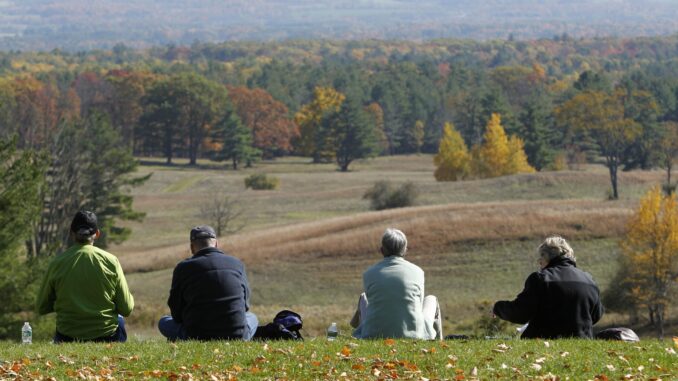
The lack of bipartisan agreement in our national and local politics is a much-lamented condition in our country today.
Congress in particular seems to have devolved into an acrimonious state in which there is little incentive for compromise. We long for the days of Ronald Reagan and Tip O’Neill, who are often canonized as the gold standard of balancing political interests with those of the country.
The reasons for this state of affairs have been extensively analyzed, and I am quite far from being in any position to offer fresh insights as to a positive pathway forward. However, I can point to one notable example of bipartisanship that does exist in our nation’s capital as well as in many state legislatures across the country.
Oddly enough in this era of monument desecration, the one area which has captured the interest and support of Democrats and Republicans alike is American battlefield preservation.
The leader in battlefield preservation is the American Battlefield Trust. A nonprofit 501(c)(3) organization, the Trust’s mission is to preserve the hallowed grounds of the Revolutionary War, the War of 1812 and the Civil War, and to educate the public about what happened on those battlefields and why it matters today.
By preserving these outdoor classrooms for future generations, we enable the remembrance and appreciation of the sacrifices made there to secure our freedoms. In the last 25 years, the Trust has saved more than 58,000 acres of endangered battlefield land at 155 sites in 25 states. Most of the land saved has been in the pathway of residential and commercial development.
Many assume the Federal Government, through the National Park Service, would preserve important historical land. This is not the case, and the Trust has successfully demonstrated how a private group of concerned citizens can make a difference in honoring the sacrifices of the men who bled and died for our freedoms by preserving the land on which they fought.
This land is not inexpensive. In addition to the generous donations of its dedicated members, the Trust has also utilized an innovative process of matching federal and state grants to leverage its fundraising effectiveness.
This is where the bipartisanship comes in.
Through the American Battlefield Protection Program (ABPP), an agency within the National Park Service, Congress has for years authorized and appropriated funds for matching grants applied to battlefield preservation.
In FY 2024, Congress appropriated $20 million to ABPP, which has been used mainly by the Trust to leverage its private donations. Support for this appropriation was bipartisan, and most notably the co-chairs of the American Battlefields Congressional Caucus are Elise Stefanik (R-N.Y.) and Gerry Connolly (D-Va.)
The Caucus has successfully garnered sustained support for this legislation over the years. Members from both sides of the aisle understand that not only does preserving America’s hallowed ground inspire appreciation of our history, but is also often ecologically positive by preserving wetlands and open space. In addition, heritage tourism benefits the local economies where the battlefield parks are located. Lastly, members of our active military use these battlefields for Staff Rides, which are on-site tours that teach leadership and tactical skills by studying the lessons of the battles.
On the state level, bipartisan legislative support for battlefield preservation has occurred in Virginia, Tennessee, Mississippi, North and South Carolina and Kentucky, among others. Tennessee, in particular, passed a real estate transfer tax that generates $4 million annually in matching grant funds to be used for heritage land preservation in the state.
As a major gift officer for the Trust from 2017-23, I witnessed firsthand the incredible generosity of its members. As a participant in the Trust’s lobbying efforts on Capitol Hill, I also witnessed the strong bipartisan support for matching grants that so benefit our country’s future generations.
On many occasions in both Republican and Democrat offices, I was told that the Trust had the only true bipartisan issue that had been presented to them. Despite the vitriol and distrust so often portrayed about Congress in the media, I always walked away from my visits on the Hill encouraged.
Perhaps this small corner of bipartisan legislative success can serve as a catalyst for further positive collaboration on other issues of more major importance to our nation.
Tom Moore is an investment adviser with Capital Investment Companies and resides in Upperville, Virginia. Tom is a native of North Carolina.


